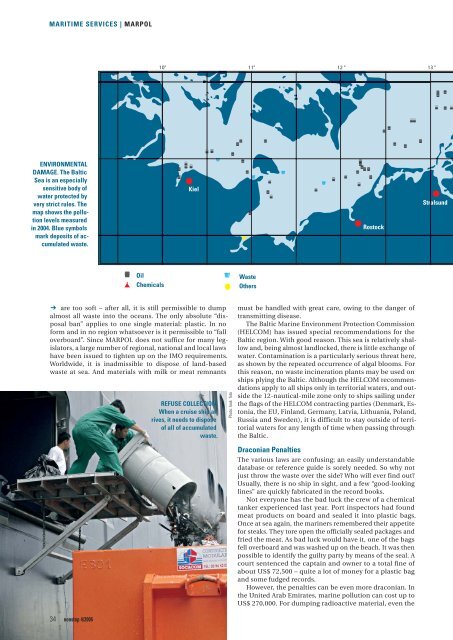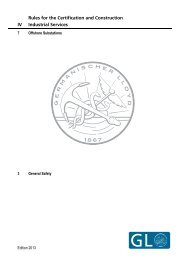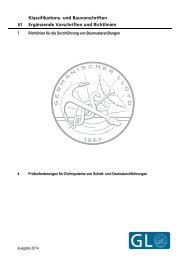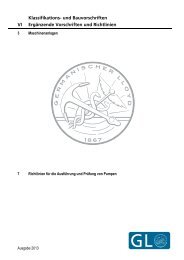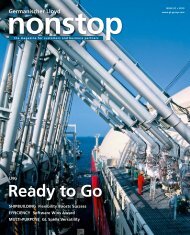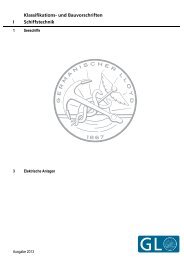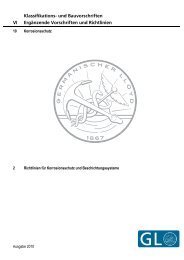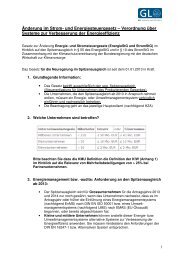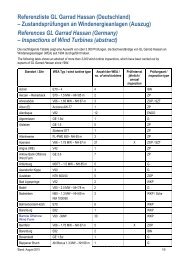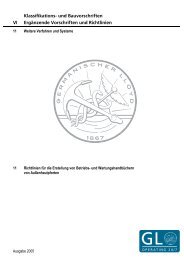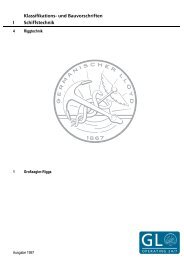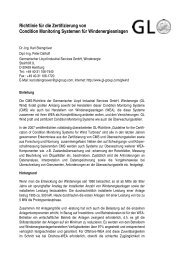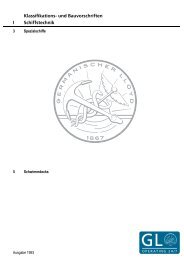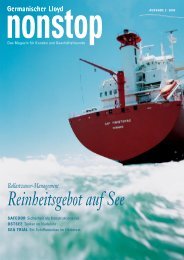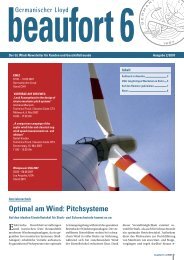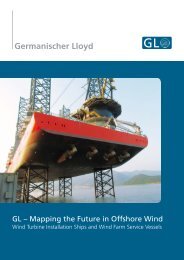Protection of Fuel Tanks Safety ahead! - GL Group
Protection of Fuel Tanks Safety ahead! - GL Group
Protection of Fuel Tanks Safety ahead! - GL Group
Create successful ePaper yourself
Turn your PDF publications into a flip-book with our unique Google optimized e-Paper software.
MARITIME SERVICES | MARPOL<br />
ENVIRONMENTAL<br />
DAMAGE. The Baltic<br />
Sea is an especially<br />
sensitive body <strong>of</strong><br />
water protected by<br />
very strict rules. The<br />
map shows the pollution<br />
levels measured<br />
in 2004. Blue symbols<br />
mark deposits <strong>of</strong> accumulated<br />
waste.<br />
10° 11° 12 ° 13 °<br />
Kiel<br />
are too s<strong>of</strong>t – after all, it is still permissible to dump<br />
almost all waste into the oceans. The only absolute “disposal<br />
ban” applies to one single material: plastic. In no<br />
form and in no region whatsoever is it permissible to “fall<br />
overboard”. Since MARPOL does not suffice for many legislators,<br />
a large number <strong>of</strong> regional, national and local laws<br />
have been issued to tighten up on the IMO requirements.<br />
Worldwide, it is inadmissible to dispose <strong>of</strong> land-based<br />
waste at sea. And materials with milk or meat remnants<br />
34 nonstop 4/2006<br />
Oil<br />
Chemicals<br />
REFUSE COLLECTION.<br />
When a cruise ship arrives,<br />
it needs to dispose<br />
<strong>of</strong> all <strong>of</strong> accumulated<br />
waste.<br />
Photo: look foto<br />
Waste<br />
Others<br />
Rostock<br />
must be handled with great care, owing to the danger <strong>of</strong><br />
transmitting disease.<br />
The Baltic Marine Environment <strong>Protection</strong> Commission<br />
(HELCOM) has issued special recommendations for the<br />
Baltic region. With good reason. This sea is relatively shallow<br />
and, being almost landlocked, there is little exchange <strong>of</strong><br />
water. Contamination is a particularly serious threat here,<br />
as shown by the repeated occurrence <strong>of</strong> algal blooms. For<br />
this reason, no waste incineration plants may be used on<br />
ships plying the Baltic. Although the HELCOM recommendations<br />
apply to all ships only in territorial waters, and outside<br />
the 12-nautical-mile zone only to ships sailing under<br />
the flags <strong>of</strong> the HELCOM contracting parties (Denmark, Estonia,<br />
the EU, Finland, Germany, Latvia, Lithuania, Poland,<br />
Russia and Sweden), it is difficult to stay outside <strong>of</strong> territorial<br />
waters for any length <strong>of</strong> time when passing through<br />
the Baltic.<br />
Draconian Penalties<br />
The various laws are confusing; an easily understandable<br />
database or reference guide is sorely needed. So why not<br />
just throw the waste over the side? Who will ever find out?<br />
Usually, there is no ship in sight, and a few “good-looking<br />
lines” are quickly fabricated in the record books.<br />
Not everyone has the bad luck the crew <strong>of</strong> a chemical<br />
tanker experienced last year. Port inspectors had found<br />
meat products on board and sealed it into plastic bags.<br />
Once at sea again, the mariners remembered their appetite<br />
for steaks. They tore open the <strong>of</strong>ficially sealed packages and<br />
fried the meat. As bad luck would have it, one <strong>of</strong> the bags<br />
fell overboard and was washed up on the beach. It was then<br />
possible to identify the guilty party by means <strong>of</strong> the seal. A<br />
court sentenced the captain and owner to a total fine <strong>of</strong><br />
about US$ 72,500 – quite a lot <strong>of</strong> money for a plastic bag<br />
and some fudged records.<br />
However, the penalties can be even more draconian. In<br />
the United Arab Emirates, marine pollution can cost up to<br />
US$ 270,000. For dumping radioactive material, even the<br />
Stralsund


